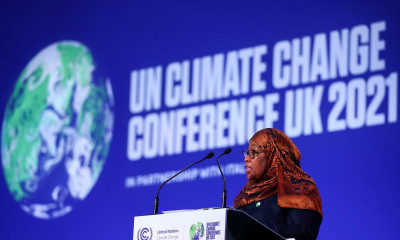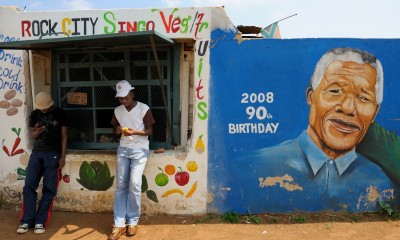I am certain that the ‘system’ they are referring to encompasses many cross-cutting systems – from the capitalist way of working and the so-called ‘business as usual’ approach, to one that puts people and planet ahead of profit. During COP 26 I witnessed first-hand the system that is meant to save us, with all its flaws and inequities, yet continues to perpetuate inaction in the very rooms addressing climate action.
The two negotiation items I followed closely were Gender and Climate Change and the Koronivia Joint Work on Agriculture sessions (which addresses concerns of food systems vulnerability and food security). In one Koronivia session, we deliberated on the presence or absence of a comma in a specific sentence for 30 minutes. While arguably, as one negotiator pointed out, ‘commas save lives’, in this room they were neither saving lives nor time. I also heard reports that in another set of negotiations, a significant amount of time was spent discussing how long a 30-minute break is, and whether this start after the mention of 30 minutes or at the point where all parties agree to the 30 minutes. To paraphrase what a colleague exclaimed, ‘people think we are in here changing the world, when in reality we are just panel-beaters of text’.
While this is just an anecdote to share what is actually discussed in the negotiating rooms, it is more important to reflect on the power dynamics that exist, ones that shadow the needs of developing countries beneath a system that favours the desires of developed countries.
For example, in the gender negotiations, one developed country refused to agree on language that ‘ensure[s] the provision of adequate support’ as ‘we all know this means financial support, and finance discussions belong in the finance room’. Side note, this country made the exact same argument at COP 25 (under significantly less climate conscious national political circumstances) and has made significant financial pledges elsewhere at COP 26. If we can’t talk about finance in the room requiring those finances, how can we ensure that programmes’ specific financial needs would be addressed in the manner they are truly needed? Or moreover, that these finances do not become an afterthought to some other action item?
In the Koronivia sessions, the imbalance of power that favours some voices more than others was blatantly obvious. Certain text was being negotiated in a productive manner (we were not arguing about commas), and new propositions and language alterations were being suggested. All seemed fair and well until I realised that the textual suggestions made by developing countries were not reflected in the document, but I am sure you can guess whose suggestions were.
In addition, there was a desire by certain parties to add text on mitigation and emission reductions to a text that’s core focus is adaptation. At first, I didn’t understand why we would not want to include mitigation language for one of the worst emitting industries globally, but after consultation and a series of interventions this became abundantly clear. Firstly, in the Paris Agreement countries agreed that their Nationally Determined Contribution (NDC) would outline how they as a country want to reduce emissions, which means they can do this through their worst emitting sectors nationally.
By including mitigation language in a sector-specific document, the content becomes prescriptive and removes that choice. Hence secondly, if sector-specific mitigation requirements are introduced, then the many countries in Africa with a reliance on both a formal and informal agricultural economy would suffer. Agriculture in a developing context is largely about lives and livelihoods, but the sector itself is one of the largest in terms of emissions. The African continent is yet to meet the food demands of her people and it is difficult to burden an already unstable system with the need to cut emissions.
While on the topic of national choice, questions of transparency and accountability come to mind. At a national level, countries determine how and where they mitigate climate change. In theory this works – those who know their national circumstances and growth plans well can decide how and where to reduce emissions. However, this is often not the case and without accountability and reporting on the plans presented in the NDCs, these targets will simply not be met, setting us on a trajectory for a catastrophe.
As already noted, words spoken publicly did not translate into the negotiation rooms, and how do we know that the already weak promises made in the NDCs will actually be realised? In addition, many parties made ‘pledges’ to phase out fossil fuels and cut methane emissions, but pledges are within the realm of political fodder and allow for a media frenzy with little to no legality to abide by. With no clear guidelines on reporting or penalties incurred for not reaching the pledges made, my hope for the achievement of climate justice is bleak.
So, what is this power dynamic and how does it impact the negotiations? Simply put, money makes the world go round. Who has the money? How was this money made? And who pays the bills for such an event to occur? When we ask these questions, the dynamic becomes clear: the power and money sit firmly in the hands of the developed world and the negotiations reflect this dynamic. If we want to fix this dynamic, we have to start talking about human rights and justice. But these discussions are spoken in hushed tones in the rooms that have the most power and shouted and demanded for in the streets.
What I sit with now is how the system can be changed, when the people favoured by it seem to only change their words and not change their actions.
Youth Delegate Tyler Booth attended COP 26 as the South African Youth Climate Action Plan Project Lead







